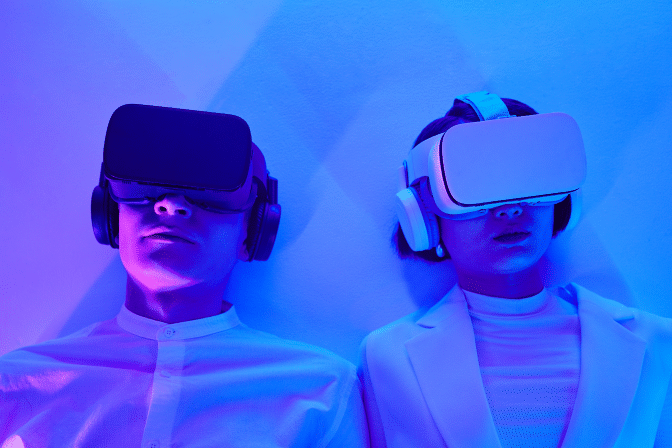In the dynamic intersection of technology and business, a fascinating symbiosis has arisen between the domain of virtual reality (VR) and the groundbreaking cryptocurrency. This convergence of these pioneering ideas has heralded the advent of a fresh epoch in shopping encounters, leading to a transformative shift in our interactions within digital marketplaces. This discourse delves into the deep-reaching influence of Bitcoin on the landscape of virtual reality commerce, probing its ramifications for both consumers and enterprises, while also offering insights into the prospective landscape of online retail. Do you desire a platform for automatic AI-based crypto trading? You’re covered by Immediate Revolution 360.
The Convergence of VR and Bitcoin
-
A Paradigm Shift in Online Shopping
The fusion of virtual reality and Bitcoin has ushered in a paradigm shift in how consumers engage with e-commerce. Traditionally, online shopping has been a two-dimensional experience, where buyers navigate static web pages. However, VR technology has introduced an immersive three-dimensional realm that mimics physical shopping environments. Shoppers can now stroll through virtual storefronts, examine products up close, and even interact with other avatars, simulating the communal aspect of in-person shopping.
-
Bitcoin’s Role as the Digital Currency
At the heart of this transformation lies Bitcoin, the pioneer of cryptocurrencies. With its decentralized nature, borderless transactions, and security features, Bitcoin has become the go-to digital currency for virtual reality commerce. Its integration into VR ecosystems has eliminated the need for traditional payment gateways, reducing transaction fees and enhancing the speed of cross-border transactions. As a result, consumers can make purchases seamlessly and securely, regardless of their geographical location.
Revolutionizing Consumer Experience
-
Enhanced Product Visualization
One of the standout features of Bitcoin-powered VR commerce is the enhanced product visualization. Shoppers can now examine products from every angle, assessing intricate details and textures before making a purchase decision. This level of immersion bridges the gap between physical and digital shopping, eradicating the uncertainty often associated with online purchases.
-
Personalized Shopping Journeys
Through the amalgamation of Bitcoin and VR, businesses have gained a powerful tool to curate personalized shopping journeys. AI algorithms analyze user behavior and preferences, tailoring product recommendations to each individual. This results in a more engaging and relevant shopping experience, increasing the likelihood of conversion and customer satisfaction.
Empowering Businesses in the Digital Landscape
-
Lowering Barriers to Entry
The integration of Bitcoin and VR has democratized the e-commerce landscape, enabling businesses of all sizes to establish a virtual presence with ease. Traditional brick-and-mortar retailers can transcend physical limitations, setting up virtual storefronts and reaching a global audience without the constraints of physical space and location.
-
Expanding Market Reach
Moreover, Bitcoin’s borderless nature has unlocked new markets for businesses. Companies can now cater to international consumers without the complexities of currency conversion and high transaction fees. This expansion of market reach promises exponential growth opportunities, fostering a competitive marketplace that drives innovation and customer-centric strategies.
Future Prospects and Considerations
-
The Potential of NFTs
As Bitcoin exerts an evolving influence on the virtual reality commerce landscape, the integration of non-fungible tokens (NFTs) presents itself as an increasingly intriguing prospect. Utilizing the capabilities of blockchain technology, NFTs introduce a distinctive method for verifying and establishing ownership of virtual assets. Within the realm of VR commerce, the potential impact of NFTs is considerable, holding the capacity to completely transform the concept of owning virtual goods. This innovation could potentially give rise to an entirely new market for digital collectibles and exclusive, limited-edition virtual items, reshaping the dynamics of virtual ownership and trade.
-
Addressing Privacy Concerns
As the convergence of Bitcoin and virtual reality unfolds with significant promise, it becomes imperative to confront the critical considerations of privacy and security. With transactions taking place within the virtual realm, the safeguarding of user data and financial particulars takes precedence. Fortunately, the foundation of Bitcoin in blockchain technology provides a robust framework equipped with formidable security mechanisms that can be harnessed to fortify user privacy and protect sensitive information effectively.

Conclusion
Within the dynamic realm of digital commerce, the fusion of Bitcoin and virtual reality has ignited a far-reaching revolution that defies conventional limitations. This symbiotic relationship has given rise to immersive shopping encounters, seamless cross-border transactions, and a spectrum of inventive opportunities, all pointing towards an impending era where the demarcation between tangible and online commerce becomes increasingly indistinct. As enterprises acclimate to this paradigm shift, the harmonious interplay between Bitcoin and virtual reality offers the tantalizing prospect of a complete transformation in the landscape of online shopping, fundamentally reshaping its current contours.
















